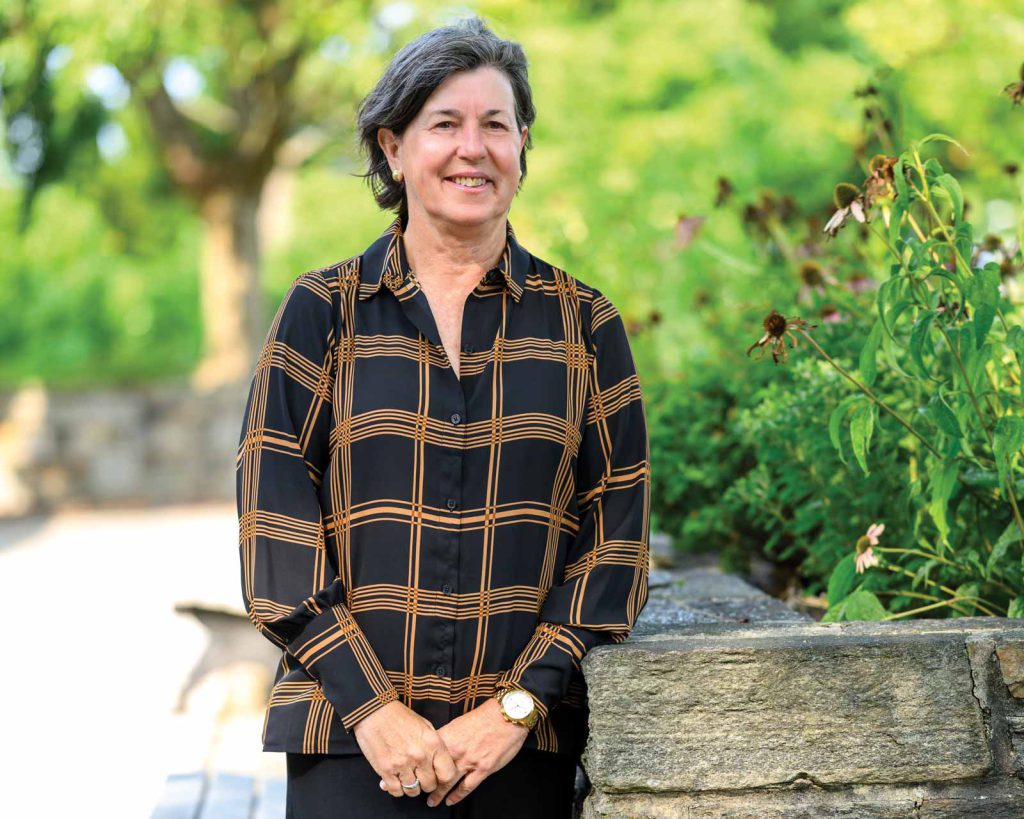BY EMILY HALNON

BIO
- MBA ’88, The University of Baltimore Merrick School of Business
- President and chief executive officer, Achieving the Dream
Community college left an impression on Karen Stout, MBA ’88, at an early age. Even then, she recognized its value. She remembers her mom taking classes at their local community college to build the skills she needed to get a job. And though Stout didn’t go to a community college herself (a field hockey scholarship paid for her undergraduate degree at the University of Delaware), she was very aware of the importance of an affordable education.
“Access to education transformed what is possible for me and my family,” she said.
When one of her early-career mentors told her she had what it takes to be a community college president, her interest was piqued. She’d always appreciated how her local community college was a cultural hub and supported many students in her hometown. Seeing as how she already believed in the mission of community colleges, and coincidentally was now working for one (Harford Community College in Bel Air, Maryland), Stout decided to go back to school to get her master’s in business administration and set herself on that career path. She chose The University of Baltimore because it was an affordable institution that would allow her to balance her classes with her full-time job. Plus, her dad, Bill Stout Jr., B.S. ’70, MBA ’77, earned graduate and undergraduate degrees at UBalt, so she was certain it would fit her financial, educational and professional needs.
“I’ve become really passionate about what community colleges can do.”
“The University of Baltimore has a special access mission that’s quite similar to a com-munity college,” she said. “It gave me an affordable option and the flexible format I needed to keep working full time while pursuing a business degree.”
She’s now the president and CEO of Achieving the Dream, a national nonprofit that helps over 300 community colleges across the country deliver a transformative education to a diverse community of students. She took on her role with Achieving the Dream in 2009, after serving 15 years as the president of Montgomery County Community College.
“Montgomery County Community College was in the Achieving the Dream network, which is what introduced me to a lot of the tools and strategies that the organization uses to bolster student success and increase equity,” she said.
“I’ve become really passionate about what community colleges can do and now I have the whole country as my campus.”
Achieving the Dream aims to transform communities by transforming community colleges. The organization works with partner schools to help them implement innovative, evidence-based programs and interventions that can help students succeed. Their mission is to create opportunities and remove barriers to give students equal access to education, training and fulfilling careers. They’ve created a robust peer-learning community and have helped partner schools double their graduation rate and fully eliminate equity gaps.
“Most community college students end up living within a 50-mile radius of their community college,” says Stout. “So, the work of community colleges really has an incredible ripple effect into the communities where they sit.”
Achieving the Dream also advocates for policy and program changes that can help support community colleges. Stout was recently appointed by President Joe Biden to serve on the National Council on the Humanities, the advisory board for the National Endowment for the Humanities. Stout has always seen the humanities as a core part of any education—including at community colleges, which can have a reputation for being focused on workforce-oriented programs.
“But sometimes people aren’t thinking that programs like literature, fine arts, music and theater are workforce programs—even though they absolutely are, as they help students build important critical thinking and analysis skills,” she said. “I think the National Council on the Humanities is making an effort to represent all sectors of higher education in its work and there is a desire to connect community colleges more directly to the advancement of the humanities.”
She hopes her work on the Council helps reinforce the necessity of the humanities—at community colleges and throughout higher education, more broadly.
“Humanities are often under attack because of the perception that they don’t have utility for jobs,” she said. “As a council, we want to continue to raise the visibility of the humanities and connect them to the fact that they help develop well-rounded citizens and workers.”
She says the need to prove relevancy will be a big part of her work going forward—both with the humanities and beyond.
“All of higher education is being asked to defend its value and return on investment,” she says. “Community colleges used to be somewhat shielded from that, but we’re not anymore. So, the next piece of our work will involve responding to that relevancy crisis and making sure community colleges are seen as a critical path to building a successful future and creating stronger, more vibrant communities.”
Emily Halnon is a freelance writer based in Eugene, Oregon.
